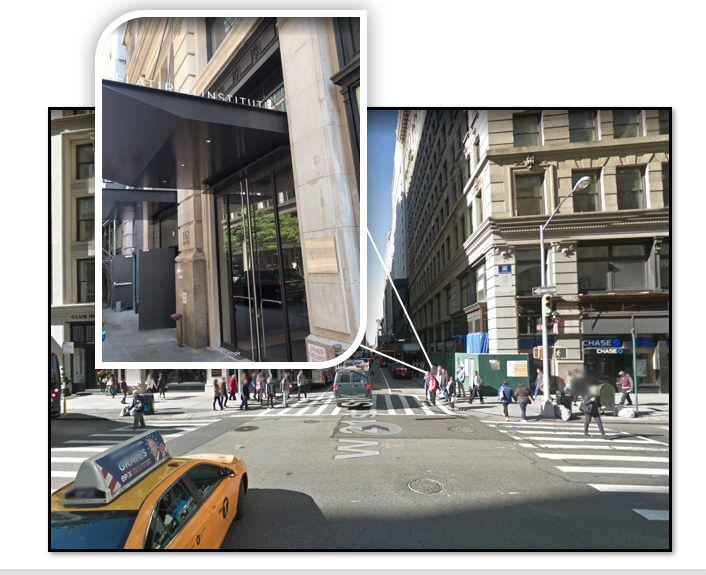Learn the Universe — an ML X Cosmology Workshop
Learn the Universe — an ML X Cosmology Workshop
Join organizers Shirley Ho, Vanessa Böhm, William Coulton, Elena Giusarma, and Chirag Modi for a workshop on the interdisciplinary work between cosmology and machine learning.
Tuesday, August 24 – Thursday, August 26
Interactive Day on Friday, August 27
-
The Center for Computational Astrophysics (CCA) is located at 162 5th Avenue. The entrance to the Flatiron Institute is on 21st Street.

&npsp;
Please check in with security upon entering the building; you will need to show your ID and proof of vaccination status for entrance into the building, and please have the health screening questionnaire completed prior to arrival as well. -
Please NOTE that anyone requesting travel and/or hotel funding will be contacted separately.
Hotel accommodations will be at the James New York – NoMad Hotel located at 22 E 29th Street between Madison and 5th Avenues: http://www.jameshotels.com/new-york-nomad/.
Check-in at the hotel is at 2:00 pm. Check-out is at 11:00 am.
Please email sadika@simonsfoundation.org or dolchick@simonsfoundation.org for the reservation link.
Travel arrangements must be made by Monday, August 16th.
-
Abhishek Maniyar NYU Adrian Bayer UC Berkeley Agnes Ferte Jet Propulsion Laboratory Aleksandra K Kusiak Columbia University Alex Kim LBNL Alice Pisani Princeton University Alina Sabyr Columbia University Ana Maria Delgado Center for Astrophysics, Harvard and Smithsonian Andrina Nicola Princeton University Andy Goulding Princeton University Anima Anandkumar Caltech Benjamin Horowitz Princeton University Biwei Dai UC Berkeley Boryana Hadzhiyska Harvard (CfA) Brian Lu Columbia University Brice Ménard Johns Hopkins University ChangHoon Hahn Princeton University Chirag Modi Center for Computational Astrophysics Christina Kreisch Princeton University Colin Hill Flatiron / Columbia David W. Hogg Flatiron Institute David Spergel Simons Foundation David Yallup University of Cambridge Dongwon Han Stony Brook University Elena Giusarma Michigan Tech University Francisco Villaescusa-Navarro Princeton University Francois Lanusse CNRS Gemma Moran Columbia University George Stein UC Berkeley Giulio Fabbian CCA and Cardiff University Huanqing Chen University of Chicago Ira Wolfson SISSA (Scuola Internazionale Superiore di Studi Avanzati) Julia Kempe NYU Kate Storey-Fisher NYU Kaze Wong Flatiron Institute Lars Hernquist Harvard University Laurence Perreault-Levasseur University of Montreal Leander Thiele Princeton University Lehman Garrison CCA Luisa Lucie-Smith Max Planck Institute for Astrophysics Matias Zaldarriaga IAS Max Lee UC Berkeley Michael Rashkovetskyi Center for Astrophysics | Harvard & Smithsonian Miles Cranmer Princeton University Neerav Kaushal Michigan Technological University Rachel Somerville CCA Rajib Rezwan Chowdhury University of Central Florida Roger de Belsunce University of Cambridge Shy Genel CCA Siamak Ravanbakhsh McGill - Mila Sihao Cheng Johns Hopkins University Simone Ferraro Lawrence Berkeley National Laboratory Stephon Alexander Brown University Sultan Hassan CCA Syed Muntazir Mehdi Abidi University of Geneva Tanveer Karim Harvard University Uros Seljak UC Berkeley Vanessa Boehm UC Berkeley Wenda Zhou NYU CDS Will Handley University of Cambridge William Coulton CCA Xiaohan Wu Harvard CfA Yin Li Flatiron Institute Yun-Ting Cheng Caltech Zoltan Haiman Columbia University -
Tuesday:
10:00am-10:15am Introduction- Welcome & Outline of the Workshop
10:15am-11:15am structured section: Simulations Based Inference
Chair: Francisco Villaescusa-Navarro- Roger de Belsunce: Unbiased inference from large-scale CMB data using likelihood-approximation schemes
- ChangHoon Hahn: Higher-Order LSS with SBI
- Ben Horowitz: hyphy – Conditional Posterior Surrogate Modeling of Hydrodynamical Physics
- Boryana Hadzhiyska: TBD
- Digvijay Wadekar : Symbolic regression for cluster mass estimation
11:45am-12:15pm Coffee
12:15pm-1:00 pm unstructured section: Problems we can’t solve with current tools that we may have a shot with ML
Chair: Simone Ferraro and Colin Hill
1:00pm-2:00pm: Lunch
2:00pm-3:45pm: structured section: Extracting Non-Gaussian Information
Chair: Andrina Nicola- Sihao Cheng: The scattering transform in cosmology, or, a CNN without Training
- Kate Storey-Fisher: Emulation of Summary Statistics for Cosmology from Galaxy Surveys
- Agnès Ferté: Categorizing cosmological models with unsupervised learning
- Colin Hill: Non-Gaussian Information in CMB Secondary Anisotropies
- Luisa Lucie-Smith: Deep learning insights into dark matter halo formation
3:45pm-4:15pm: Coffee
4:15pm-5:00pm: unstructured section: Have non-Gaussian statistics been made redundant?
Chair: Zoltan Haiman
RECEPTION
Wednesday:
10:00am-11:45am structured section: Simulation X ML
Chair: Sultan Hassan- Francisco Villaescusa-Navarro: The Cosmology and Astrophysics with Machine Learning Simulations (CAMELS) project
- Siamak Ravanbakhsh: Deep Networks for Spherical Data
- Neerav Kaushal: Mapping from Fast Simulations to Full N-body Simulations
- Yin Li: Cosmological Forward Modeling with Adjoint Method
- Leander Thiele: DeepSets applied to Clusters: Machine learning the Lagrangian way
11:45am-12:15pm Coffee
12:15pm-1:00pm: unstructured section: Pitch your Astro challenge in 5 mins OR Pitch your method in 5 mins
(participants can prepare a slide or two for this session)
Chair: ChangHoon Han and Miles Cranmer
1:00pm-2:00pm: Lunch
2:00pm-3:45pm: structured section: Robust ML for science
Chair: Yin Li- Biwei Dai: Translation and Rotation Equivariant Normalizing Flow (TRENF) for Optimal Cosmological Analysis
- David Yallup : Principled Bayesian Neural Networks
- Miles Cranmer: Histogram Pooling Operators for Interpretable Deep Learning in Cosmology
3:45pm-4:15pm: Coffee
4:15pm-5:00pm: unstructured section: ML 4 Science – Promises and Problems
Chair: Viviana Acquaviva
DINNER
Thursday:
10:00am-11:00am unstructured section: The next Decade in Cosmology
Chair: David Spergel
11:00am-11:30am Coffee
11:30am-1:00pm: structured section: Cosmological Applications
Chair: Alice Pisani- Andrina Nicola : Forecasting cosmological and astrophysical constraints from electron-matter cross-correlations
- Christina Kreisch: Precision Cosmology from Voids in the Machine Learning Era
- Ira Wolfson: The Fault In Our Spectrum: A ‘no go’ on small field models analytics
- Adrian Bayer: The Look-Elsewhere Effect
- Max Lee: Gradient based inference in cosmology using MADLens
- Alina Sabyr: Cosmological Constraints from Weak Lensing Peaks: Can Halo Models Accurately Predict Peak Counts?
1:00pm-2:00pm: Lunch
2:00pm-3:45pm: structured section: Simons Collaboration “Learning the Universe”
Chair: Shirley Ho- Greg Bryan, Introducing the Simons Collaboration “Learning the Universe”
- Rachel Somerville: New methods to model galaxy formation so that we can Learn the Universe
- Ana Maria Delgado: Modeling Galaxy-Halo connection with Machine Learning
- Sultan Hassan: HIFlow: Fast Emulator of HI maps using Normalizing Flow.
3:45-4:15 pm: Coffee
4:15pm-5:00pm: unstructured section: What qualifies as interpretability? Do we need it?
Chair: Julia Kempe and Vanessa Bohm
SOCIAL